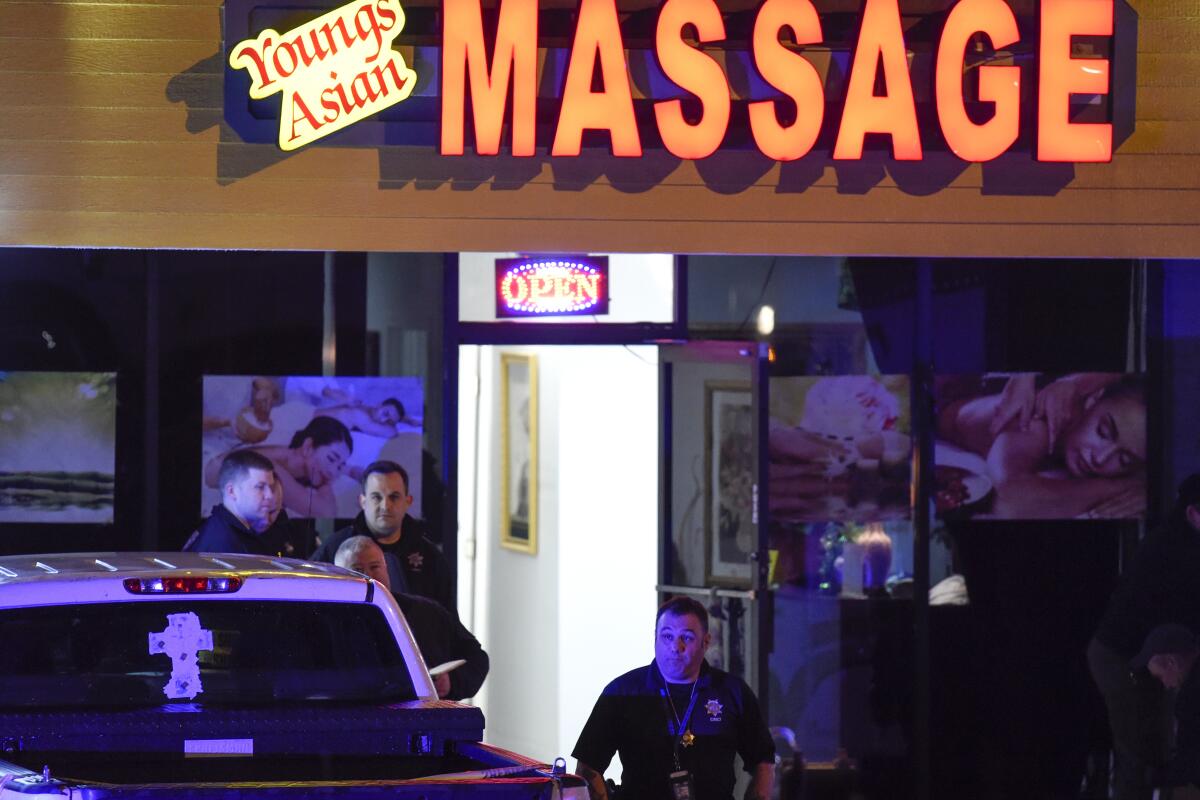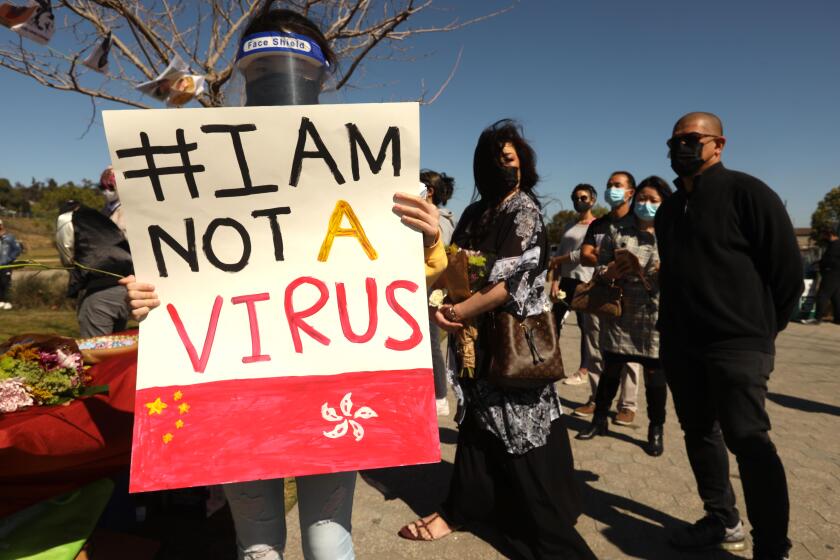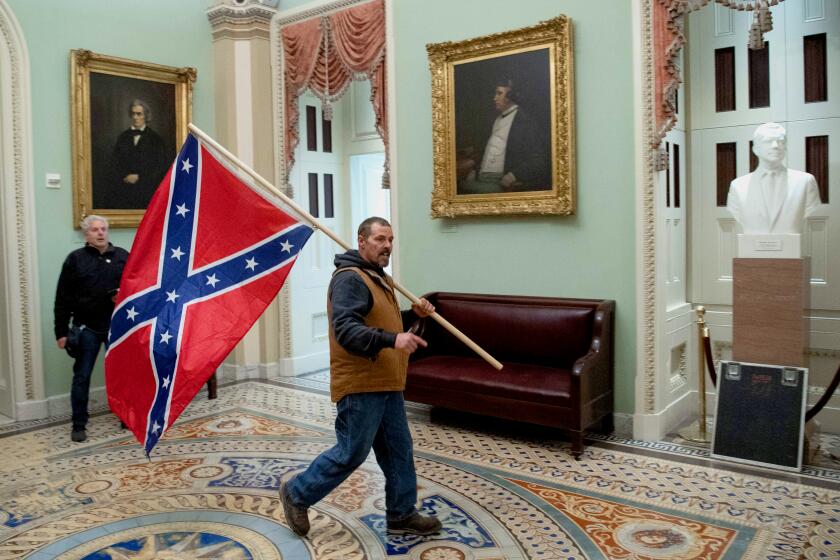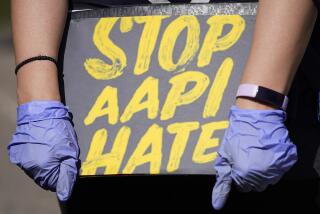Atlanta spa shootings stir fear amid historic rise in hate crimes against Asian Americans
- Share via
June Macon planned to celebrate this week when her mother and grandmother had gotten COVID-19 vaccine shots, including finally hugging them after months of separation during the pandemic.
But after a gunman in the Atlanta area left eight people dead — six of them women of Asian descent — Macon, a Korean American, said she had “gone from really, really high to really, really low.”
Macon, a doctoral candidate at the University of Illinois at Chicago, said Wednesday she had watched television news reports of the violence with a heavy heart.
“There is so much hatred and violence already against Asian women,” Macon said during a phone interview. “We don’t need any more.”
The 21-year-old man suspected in the Tuesday spa shootings was taken into custody in southwest Georgia hours later.
Police on Wednesday charged Robert Aaron Long, 21, with eight counts of murder and homicide and one of aggravated assault in the Tuesday killings at three spas in and around Atlanta. Police said the early stages of their investigation indicated that Long “did not appear to be” motivated by race and was possibly seeking revenge on women at spas he frequented out of frustrations with what an official called his “sexual addiction.”
But for many Asian Americans, the killings further fueled fears about anti-Asian hatred that has mounted over the last year as police and advocacy groups have reported record numbers of hate crimes and incidents of harassment. Activists have pointed to former President Trump as being responsible for some of the hostility toward Asian Americans, citing his use of terms such as “China virus,” “Wuhan virus” and “kung flu” in referring to the coronavirus — which was first detected in Wuhan, China.
“I’m checking in with my friends, with my family. We’re all wondering what will happen next,” said Macon, 35. “Who will the next person be?”
Asian American civil rights groups have raised concerns about violence in recent weeks amid new data showing a historic rise in anti-Asian hate crimes across parts of the nation with the largest Asian American communities.
In a survey of police departments in 16 major cities, the Center for the Study of Hate and Extremism at Cal State San Bernardino tallied 122 anti-Asian hate crimes last year. The number was a 149% increase from the 49 in 2019.
New York, Los Angeles, Boston, Seattle and San Jose saw their highest numbers of anti-Asian hate crimes in at least five years. The overall increase in the 16 cities surveyed came as the total number of hate crimes against all minority groups in those cities declined from 1,845 to 1,717.
About 68% of the anti-Asian attacks documented during the pandemic were verbal harassment, 21% were shunning and 11% were physical assaults.
In Seattle, anti-Asian hate crimes increased by 33% in 2020, a jump from nine to 12 cases. Hateful incidents have continued this year, including messages — “China you will pay” and “go home” — written in hay this week in parking lots of two Seattle churches whose congregants include Asian Americans.
Kendall Kosai, an Anti-Defamation League associate regional director in Seattle, said in a phone interview that regardless of the intent of the suspect in the Atlanta attacks, “it sends a chilling message to the Asian and Pacific Islander community.”
Kosai, a fourth-generation Japanese American whose grandparents were sent from Kent, Wash., to an incarceration camp in Wyoming during World War II, said he feared that “Asian Americans will start feeling ashamed of who they are and stop embracing their cultural heritage.”

This week, Stop AAPI Hate, a tracker launched a year ago by Asian American advocacy groups, released data on 3,800 incidents of harassment and violence against Asian Americans that took place over the last year. The majority of the reports, 68%, targeted women and involved harassment. People of Chinese and Korean descent were the most frequent victims, with many perpetrators verbally blaming Asian Americans for the pandemic.
The organization said in statements Wednesday that it believed racism could be a factor in the Atlanta incidents. Police have so far emphasized other possible reasons for the killings.
“As the facts of the Atlanta tragedy continue to emerge, it’s important that we do NOT rule out racism,” Stop AAPI Hate tweeted Wednesday. “Law enforcement is leading with a narrative that yesterday’s violent incident was not racially motivated based on the shooter’s testimony. The fact remains that all but two of the victims in this tragic incident were Asian American women and that these were all Asian-owned businesses.”

It’s a line of reasoning that resonated with Mimi Chung, a Korean American art director in New York.
“For whatever reason, this man blamed Asian people, Asian women specifically, and decided their lives were worth ending,” Chung, 46, said in a phone interview. “I don’t think you have to try hard to see that this is racism.”
Chung said the deaths reminded her of her own brushes with racism and harmful sexual stereotypes about Asian women.
“Racism for Asian women doesn’t just come in harassment or run-of-the-mill violence. It also comes as this hypersexualization of us,” she said. “I’ve experienced both. Early in the pandemic, I went to the hospital for an arm injury and was told by a random man to ‘Go back to COVID f—ing China.’ But I’ve also been told before to take an egg roll and stick it up my you-know-what.”
In Renton, Wash., Terry Yaplee said in a phone interview that he still wasn’t sure how much racism may have played a role in the slayings in Georgia.
An Army veteran who received the Bronze Star for service in Vietnam, he’s seen racism firsthand many times over his 70 years, including this year. As a bus driver in recent years, he was often cut off and told to “go back” to where he came from.
Domestic extremism’s danger to the U.S. has grown in 2021, declassified intelligence report says.
His latest encounter was Tuesday, when he arrived at a barber shop, signed the customer list and tried to walk out the door to wait outside. A white man, he said, stood in the doorway and blocked his path before saying, “Get the f— out of here!”
Yaplee, a Chinese American, was certain it was because of his race.
“I know you weren’t talking to me,” Yaplee told the man, who ignored him and walked inside. When Yaplee returned for his cut, the man continued to stare at him from outside until the barber told him to stop.
“I thought we were moving forward and away from all that,” Yaplee said of racism in America.
After the Atlanta shootings, Yaplee wrote on Facebook that it looked to be “open season” on Asian Americans in Atlanta. It was a comment that he reflected on more later.
“I misspoke because it infuriated me,” he said. “As you read into it and hear the news reports, they’re saying maybe it wasn’t racially motivated.”
Kaleem reported from Los Angeles and Read from Seattle.
More to Read
Sign up for Essential California
The most important California stories and recommendations in your inbox every morning.
You may occasionally receive promotional content from the Los Angeles Times.















